Hello everyone! Happy Sunday!
It’s been bitterly cold this week, and I’ve decided I’m fine with it. A balmy December feels more like a crisis than a holiday miracle. I mentioned this to my friend Jonathan over coffee at Edda in Ohio City. Naturally, we spiraled into an existential conversation about climate change.
The sandwich I ordered—a ham, brie, and jam situation—tasted like what I can only describe as dusty vintage lace. Jonathan took one bite and said, “How does this taste exactly like how an antique store smells?” My senses are on point; it’s a talent!
Edda is otherwise excellent: floor-to-ceiling windows, really cool light fixture above the register, a very Ohio City crowd (I think they all live in the Intro building - quite expensive), and the recurring thought, “but, like, what are your actual jobs?” It’s great!

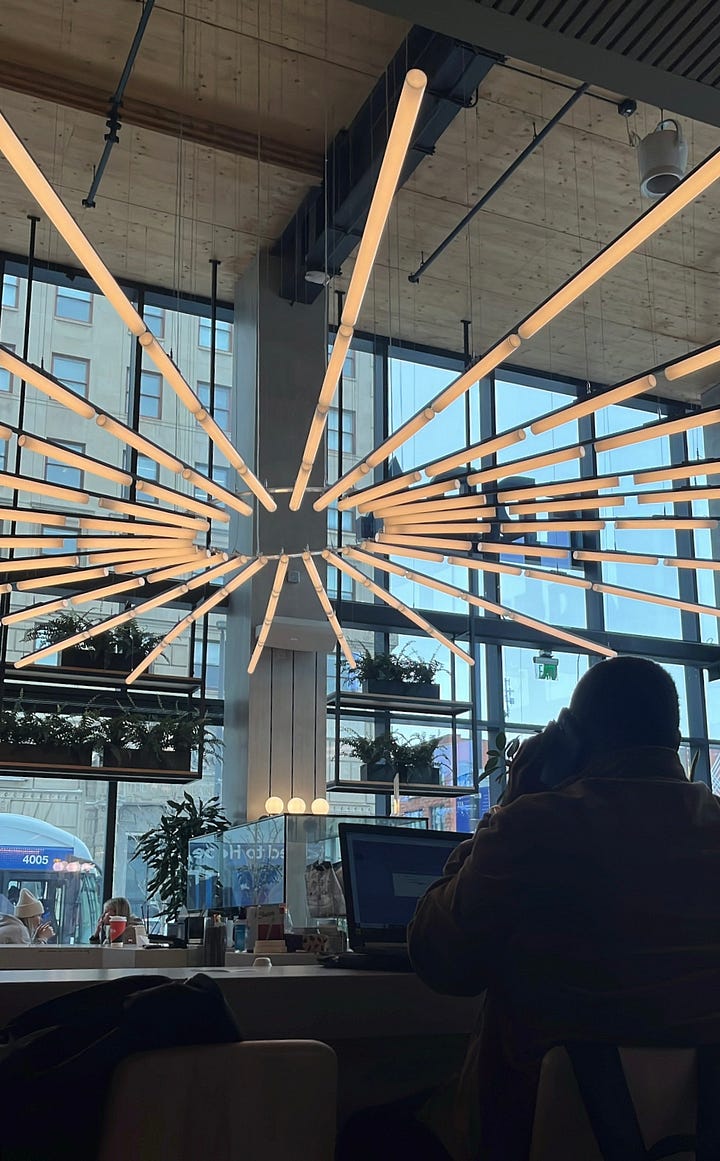
This week, I’m diving into a topic I thought I’d never touch: the economy. Ugh. Boring, confusing, nobody understands it — certainely not me! But then The Atlantic ran a piece titled “The Three Pillars of the Bro-Economy,” and, well, they hooked me.
So, I did the research. Now you have to, too. Feeling like Jaden Smith in this clip:
The Rise of the “Bro-Economy” and What it Means for Cleveland
What is the “Bro-Economy”?
Imagine a casino where the dress code is Patagonia vests, the soundtrack is Joe Rogan podcasts, and the house special is a crypto cocktail—volatile, overpriced, and just bitter enough to taste expensive.
Welcome to the bro-economy: high-risk finance culture wrapped in hyper-masculine aesthetics. It’s a world where newly re-elected POTUS Donald Trump is (for some reason) streaming from every platform that hasn’t banned him, declaring:
“If the country does not build out its cryptocurrency ecosystem, we’re not going to be the biggest, and we have to be the biggest and the best.”
The Atlantic’s Annie Lowrey identifies the three pillars of the bro-economy:
Day Trading: Those Instagram stories from barely-graduated high school seniors that say, “Good day in the market. DM for tips.” Amateur traders making impulsive, often uninformed moves on apps like Robinhood whilst running on pure hubris.
Crypto: Digital currencies that fluctuate wildly based on social media trends and the whims of public figures. When I ask finance guys to explain cryptocurrency, they often respond, “that’s a loaded question.”
Sports Betting: Casual bets turned billion-dollar businesses, with platforms like FanDuel making it more accessible—and addictive.
All three are volatile, all three are deeply online, and, as Lowrey puts it, like “three floors in one bustling, high-stakes casino.”
Cleveland’s Bro-Economy: A Case Study in the Ego-System
Secondary cities (like Cleveland) often have their own quirk: economic ego-systems. An ego-system is what happens when a city chases headlines over meaningful progress. Individual interests, short-term gains, and financial capital take precedence over collective wellbeing.1 Transparency is often limited, accountability is selective, and collective wellbeing is rarely the goal.
In 2018, Cleveland lawyer Jon Pinney bluntly summarized this dynamic:
“We are getting our butts kicked. We are dead last in most economic metrics.”
He wasn’t wrong. But the irony? Pinney supported some of the very projects that embodied the ego-system: Blockland and City Block.

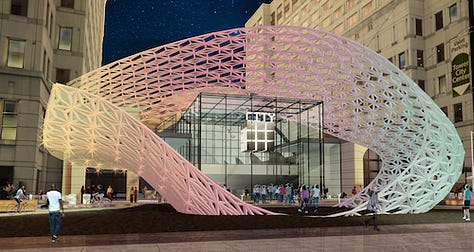

In 2019, Bernie Moreno—luxury car dealer turned Senate hopeful—rolled out Blockland, a blockchain-driven vision for Cleveland. It promised a tech renaissance, a hub for innovation, and support for small businesses. Pinney co-signed it, believing it could break Cleveland’s cycle of stagnation.
Blockland’s sequel, City Block, was supposed to turn Tower City into a blockchain-powered innovation center. I imagine it like a Silicon Valley cosplay, but with the Terminal Tower as the backdrop.
Then the plot twist: Moreno pivoted to politics, ran for Senate, and won. Blockland fizzled. City Block? Seemingly vanished. The ego-system struck again.
Connecting the Dots
Here’s the chain of connections. My thesis, if you will:
Moreno loves Trump.
Trump loves Moreno.
They both love crypto.
Crypto loves high-risk, vulnerable populations.
A toxic love triangle.
Moreno’s Senate campaign was heavily funded by pro-crypto donors who saw him as an investment in keeping the bro-economy alive. Now that he’s in office, his agenda syncs perfectly with Trump’s crypto-friendly stance.
Remember:
Blockland was Cleveland’s bro-economy test run.
Moreno now has the backing: Trump’s influence, crypto money, and a Senate seat.
The ego-system persists: Cleveland still falls for shiny promises.
Could Cleveland become a bro-economy playground? It’s not out of the question. High-risk finance rebranded as “innovation” is a seductive pitch for a city always looking to reinvent itself.
So, Who Wins?
In any casino, the house always wins.
The platforms, investors, and power players profit whether the gamble works or not. When their bets fail, it’s just a “wild day in the market.” The loss is a story for later, a punchline for dinner with friends who also get it.
Risk for them is an aesthetic. A hobby. A game they can log out of.
For everyone else, the stakes are real.
The people who put $200 into crypto because a YouTube guru promised a quick flip? When the bubble bursts, that’s groceries gone and rent unpaid. The student hoping Robinhood trades might shrink their loan balance? They’ve just turned debt into another kind of loss.
When the bro-economy collides with Cleveland’s ego-system, the fallout is predictable:
Small businesses lose investments that never materialize.
Residents lose stability when promised jobs disappear.
Communities lose time, trust, and resources they can’t afford to spare.
In a city like Cleveland—the second-poorest big city in America—these losses aren’t abstract. They’re felt in empty storefronts, broken promises, and a gap that just keeps getting wider. The bros move on. The damage stays. The promise of innovation? Just a placeholder for more of the same.
The house wins because it always does. Everyone else gets the bill.
Final Thoughts…
I connect the dots. I notice the patterns. What you do with that info? Up to you!
Maybe crypto works out. Maybe it doesn’t. Either way: look past the hype, hold leaders accountable, invest in the basics—collaboration, transparency, community focus—and stay informed.
Next time we talk about the economy, it’ll be about something lighter—like the inexplicable stranglehold skinny khaki pants have on finance bros.
Le Bal Meets Cleveland: If your feed was filled with Le Bal des Débutantes — nepo babies in couture — you’re not alone. Turns out, Cleveland has its own version: The Assembly Ball. The website? Needs a refresh. The white satin dresses? Time to let them go.
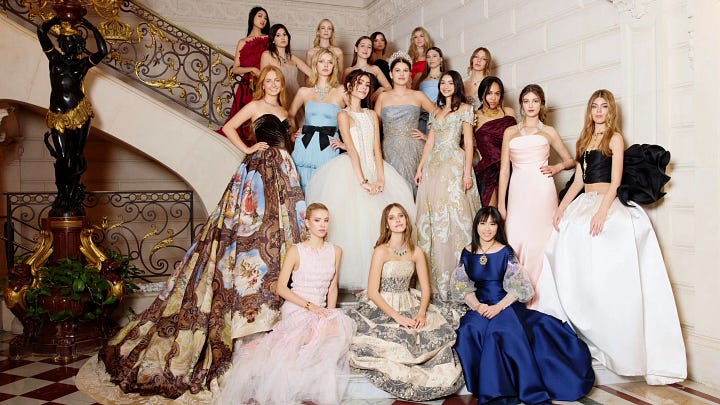

Abundance Mindset: In a recent Crain’s op-ed, Baiju R. Shah of Greater Cleveland Partnership called for saying “yes” to all opportunities for Cleveland in 2025. I agree. Maybe skip crypto, though.
Ok, I’ll bite: I don’t understand the Cavs’ unofficial Froggy Frog mascot. Why a frog? Why does he exist? When did he show up? I’m so confused.
New Restaurant: The Friar’s Table, Playhouse Square’s newest restaurant, opened last Friday. The theme? Minimalism. “At the core, it’s very calm, very peaceful. Only five wines on the list. It’s all about great food and community,” said Brandon Chrostowski, the restaurant’s consultant.
I have noticed the Cleveland finance/business boy coat of choice for this winter is the black North Face puffer. This probably tracks in other cities, too. Would love for non-Clevelanders to confirm or deny.
Word of the Year: Oxford has crowned “brain rot” as 2024’s word of the year. Here’s an example sentence: “I have brain rot from learning about meme stocks and 4chan.”
Overheard
Heinen’s, Downtown:
Two guys in black North Face puffers:
Man #1: “You’re still free market, right?”
Man #2: “Yes, very much so!”
Didn’t know “free market” was a personality trait, but okay.
One last thing….
This is the outfit I wore to the Suki Waterhouse concert. Thought I’d share.
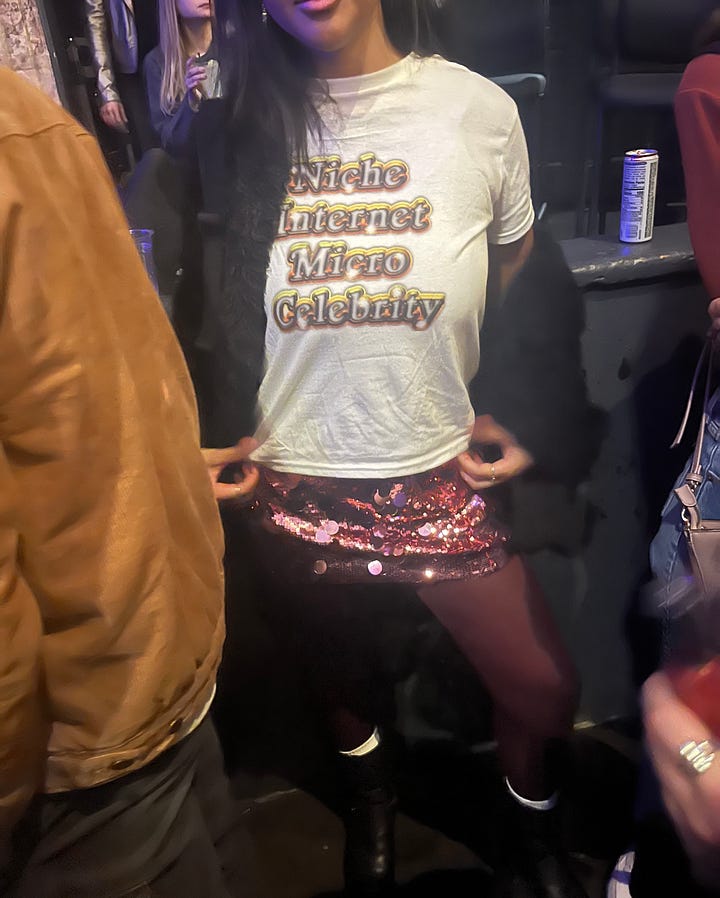

As always, tips and stories: talkidletome@gmail.com or DM me on IG.
See you next week.
XO, Cassidy
Citing my sources: https://neighborhoodeconomics.org/ecosystem-vs-egosystem/#:~:text=An%20ego%2Dsystem%20is%20structured,shared%20wellbeing%20of%20the%20community.





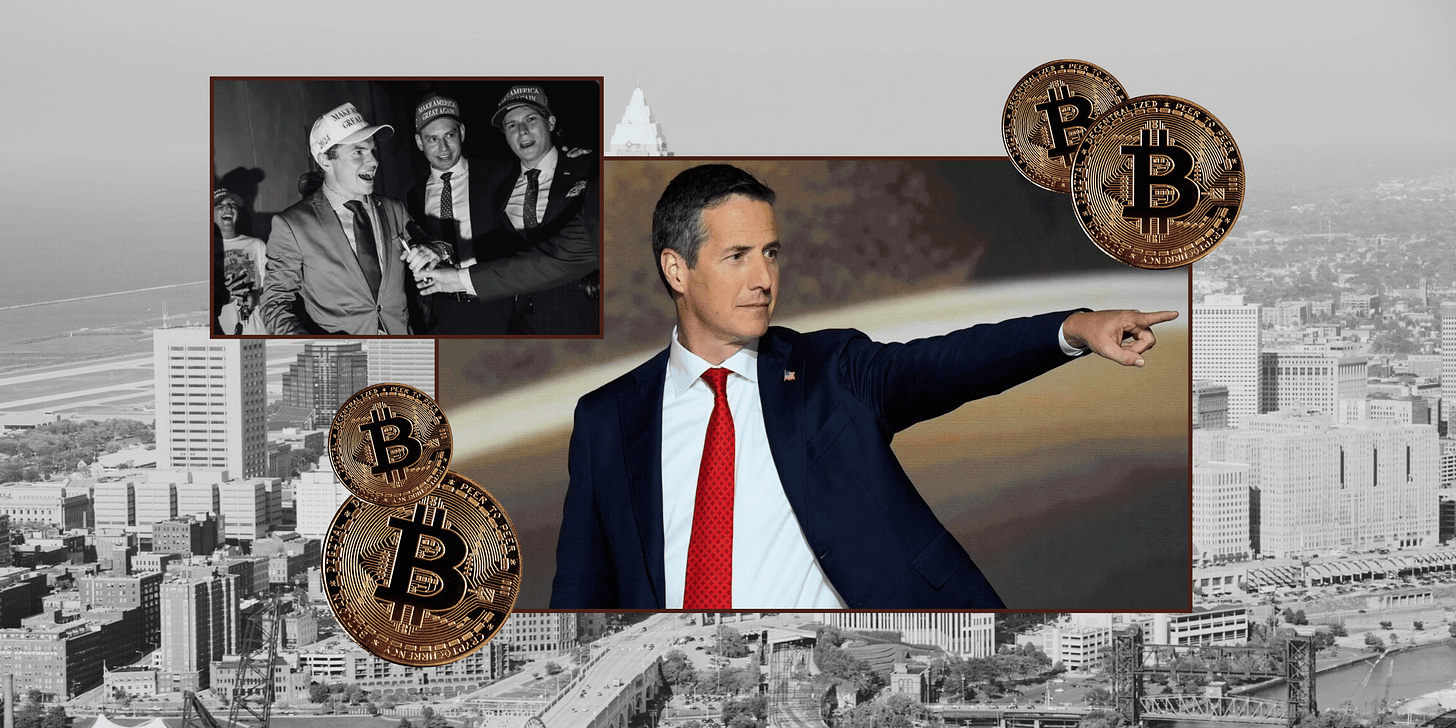




the outfit for suki saved me from the scary bitcoin convo 🙏🏼
"bitcoin is my safe word" will haunt my nightmares </3